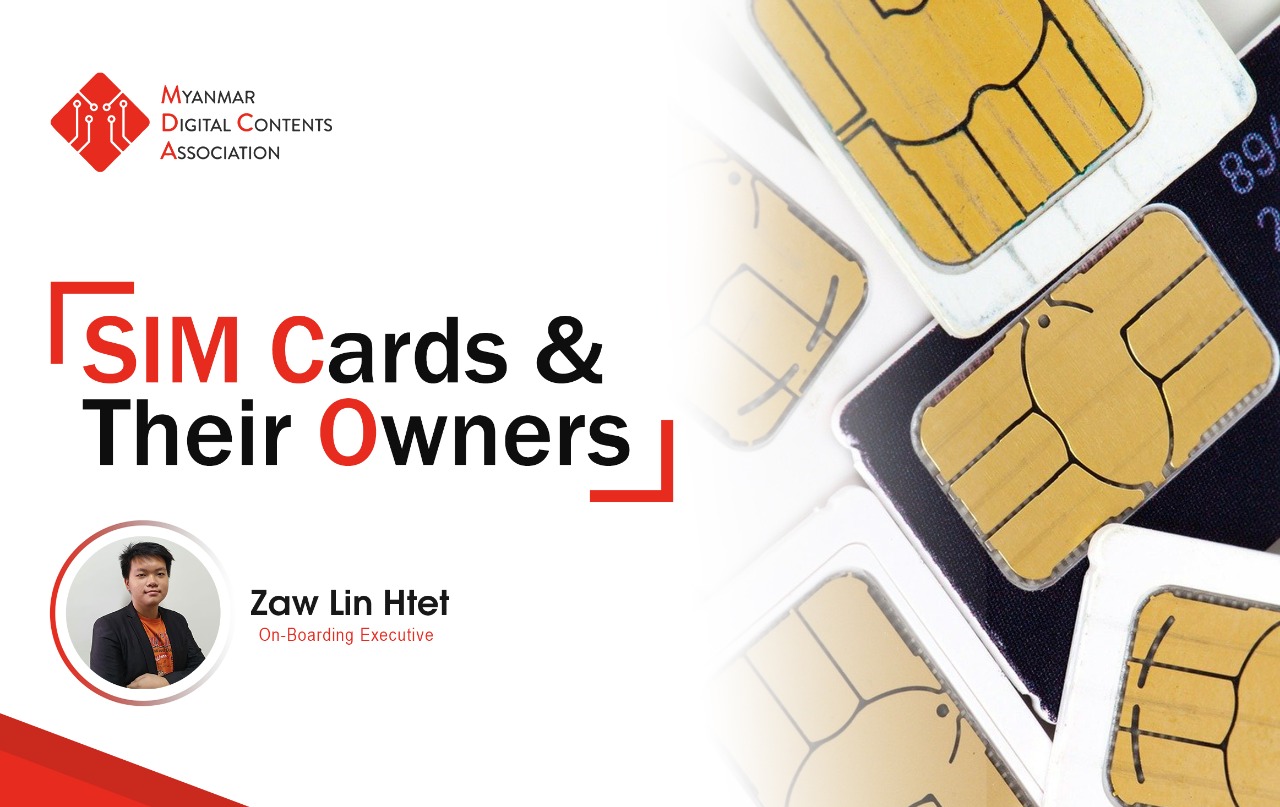
"SIM Cards and Their Owners"
How many SIM cards do you currently have in your hands? Of all the SIM cards you possess, how many of them are actually registered with your name? Have you ever stopped to wonder their real values and their prominence for you? Have you figured out other various possibilities of a SIM card, except using it for basic daily routines: calling, texting, and surfing the web via the Internet?
Taking a quick glance back to the past, it is definitely undeniable how difficult it is to get a hold of a SIM card due to its exorbitant and lengthy process of registration. Nevertheless, due to the instant change from an age of costly registration in person to a downsize of abundant availability almost everywhere with only 1500 Kyats each, people, nowadays, have lost track of the necessity to properly register with these drastic changes, especially for those people who had never had the luxury of owning a SIM card before 2013 because of the price (about USD 2,000) and the procedure. Moreover, according to a research by Hootsuite in January 2019, the current amount of SIM card usage in Myanmar is 56.57 million and is also increasing tremendously, which is apparently more than the total population in the country, 54.10 million. This can only mean that there are currently 2 or more SIM cards in the hands of the majority of Myanmar citizens in most cases because of the unbelievable figure: 105% compared to the total population!
Ultimately, this has triggered a major problem in terms of solving crimes, especially for those related with technology: Cybercrimes. This means that, with the immense increase in the number of cybercrimes within this decade, it has become harder for the government to trace back to the real perpetrators as SIMs can also be thrown after use due to their easy and cheap accessibility over the years. Besides, improper registration also acts as another cause for cybercrimes such as fraud, cyber-bullying, identity thefts, financial thefts and even to a national-level threat: Cyberterrorism. With millions and millions of SIMs at large without proper registration, the respective authority and the government are finding it difficult to identify the culprits, let alone catch them, which in turn, have caused the rate of cyber-crimes to rise exponentially as days go by.
Looking from the perspective of the retailers, the increase in the number of telecom operators, in other words, competitors being the major cause in the above changes, telecom operators had had a change in their sales strategies over the past years, resulting in achieving their acquisition targets through “Distributors”. Consequently, this had triggered the registration of SIM cards with the names of the distributors for the purpose of reaching their sales target as fast as possible. Despite the convenience it provides for both the consumers and the distributors, none of them have a glimpse of the consequences for telecom operators.
Before identifying the consequences, it is crucial to consider the root first. Currently, there are no limitations as to how many SIMs are allowed per citizen and restrictions namely a proper registration process, allowing countless activation of SIMs even from a single person. Even though SIM cards have been activated on a vast amount, it is obvious that the majority of the SIMs are currently unused because of the distributors’ desire to reach the target in the fastest way possible. This has led to an extensive waste of resources on a high scale including both money and the numbers on the SIM cards.
Likewise, with the increase in intense competition among telecom operators in penetrating the local market, they have developed new promotional strategies, which is to involve extra bonuses of all sorts. Doing so has triggered the same effect as distributors registering a mass number of SIMs with their own names in order to hit a destined sales target. This is mainly because, with the extra promotional bonuses being more worthy than the original price, 1500 Kyats, consumers unwittingly buy as many SIMs as they require just to consume those bonuses and discard them afterwards. Similar to the previous incident mentioned above, this is also caused by both the lack of limitations as to how many SIMs are allowed in one’s possession and the lack of a proper registration system to keep records. Ultimately, the devastating result of this is a tremendous waste in resources and numbers on the SIM cards from the perspective of the telecom operators.
To conclude, with large amounts of resources at risk and improper registration systems leading to an unsystematic market along with the rise in cybercrimes, it is high time that these barriers are broken down and the whole telecommunication sector evolves for the better with a systematic type of registration. Therefore, the Posts and Telecommunications Department (PTD) will soon be bringing a vital solution of a new registration system, in other words, introducing SIM registration probably with biometrics that are unique to all the people in Myanmar. Moreover, individual allowance of SIM cards per person, from each telecom operator, will soon be limited for a better, safer telecom market which will hopefully act as a lifesaver for all the respective troubled bodies as well as a mean to effectively attack cyber-crimes, hoping this will lead to a healthier telecom market.
Myanmar Digital Contents Association
:Bld 19, #06-704/705, MICT Park, Hlaing Township, Yangon, Myanmar
: +959 894 7977 74